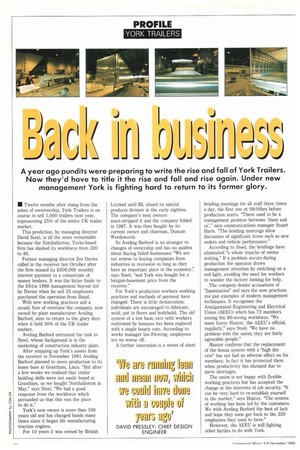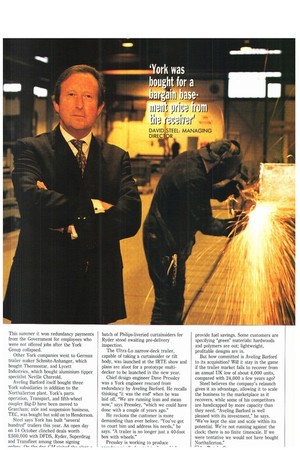tti if ] f*.-J jJ
Page 26

Page 27

If you've noticed an error in this article please click here to report it so we can fix it.
A year ago pundits were preparing to write the rise and fall of York Trailers. Now they'd have to title it the rise and fall and rise again. Under new management York is fighting hard to return to its former glory.
• Twelve months after rising from the ashes of receivership, York Trailers is on course to sell 1,000 trailers next year, representing 25% of the entire UK trailer market.
This prediction, by managing director David Steel, is all the more remarkable because the Northallerton, Yorks-based firm has slashed its workforce from 320 to 80.
Former managing director Jim Davies called in the receiver last October after the firm missed its £600,000 monthly interest payment to a consortium of money lenders. It was the bitter finale to the £61m 1988 management buyout led by Davies when he and 25 employees purchased the operation from Bunzl.
With new working practices and a steady flow of overtime the company, now owned by plant manufacturer Aveling Barford, aims to return to the glory days when it held 30% of the UK trailer market.
Aveling Barford entrusted the task to Steel, whose background is in the marketing of construction industry plant.
After snapping up York's assets from the receiver in November 1991 Aveling Barford planned to move production to its home base at Grantham, Lincs. "But after a few weeks we realised that trailer building skills were not easily found at Grantham, so we bought Northallerton in May," says Steel. "We had a good response from the workforce which persuaded us that this was the place to do it."
York's new owner is more than 100 years old and has changed hands many times since it began life manufacturing traction engines.
For 10 years it was owned by British Leyland until BL closed its special products division in the early eighties. The company's next owners asset-stripped it and the company folded in 1987. It was then bought by its current owner and chairman, Duncan Wordsworth.
So Aveling Barford is no stranger to changes of ownership and has no qualms about buying failed businesses: "We are not averse to buying companies from industries in recession as long as they have an important place in the economy," says Steel, "and York was bought for a bargain-basement price from the receiver."
For York's production workers working practices and methods of payment have changed. There is little demarcation: individuals are encouraged to fabricate, weld, put in floors and bodybuild. The old system of a low basic rate with workers motivated by bonuses has been replaced with a single hourly rate. According to works manager Ian Fleming, employees are no worse off, A further innovation is a series of short briefing meetings for all staff three times a day, the first one at 08:00hrs before production starts. "There used to be a management problem between 'them and us'," says communications manager Stuart Harle. "The briefing meetings allow discussion of significant items such as new orders and vehicle performance."
According to Steel, the briefings have eliminated "a whole tranche of memo writing." If a problem occurs during production the operator draws management attention by switching on a red light, avoiding the need for workers to wander the factory looking for help.
The company denies accusations of "Japanisation" and says the new practices are just examples of modern management techniques. It recognises the Amalgamated Engineering and Electrical Union (AEEU) which has 72 members among the 80-strong workforce. "We meet Gerry Hunter, the AEEU's official, regularly," says Steel. "We have no problem with the union; they are fairly agreeable people."
Hunter confirms that the replacement of the bonus system with a "high day rate" has not had an adverse effect on his members. In fact it has protected them when productivity has slumped due to parts shortages.
The union is not happy with flexible working practices but has accepted the change in the interests of job security. "It can be very hard to re-establish yourself in the market," says Hunter. "The system of working has been led by the customers. We wish Aveling Barford the best of luck and hope they soon get back to the 320 employees they used to have."
However, the AEEU is still fighting other battles to do with York. This summer it won redundancy payments from the Government for employees who were not offered jobs after the York Group collapsed.
Other York companies went to German trailer maker Schmitz-Anhanger, which bought Thermostar, and Lycett Industries, which bought aluminium tipper specialist Neville Charrold.
Aveling Barford itself bought three York subsidiaries in addition to the Northallerton plant. York's parts operation, Transpart, and fifth-wheel coupler Big-D have been moved to Grantham; axle and suspension business, TEC, was bought but sold on to Henderson.
Steel says York has built "several hundred" trailers this year. An open day on 14 October clinched deals worth £500,000 with INDS, Ryder, Superdrug and Transfleet among those signing batch of Philips-livened curtainsiders for Ryder stood awaiting pre-delivery inspection.
The Ultra-Lo narrow-deck trailer, capable of taking a curtainsider or tilt body, was launched at the IRTE show and plans are afoot for a prototype multidecker to be launched in the new year.
Chief design engineer Dave Pressley was a York engineer rescued from redundancy by Aveling Barford. He recalls thinking "it was the end" when he was laid off. "We are running lean and mean now," says Pressley, "which we could have done with a couple of years ago."
He reckons the customer is more demanding than ever before. "You've got to court him and address his needs," he says. "A trailer is no longer just a 40-foot box with wheels."
Pressley is working to produce provide fuel savings. Some customers are specifying "green" materials: hardwoods and polymers are out; lightweight, profitable designs are in.
But how committed is Aveling Barford to its acquisition? Will it stay in the game if the trailer market fails to recover from an annual UK low of about 4,000 units, compared with 24,000 a few years ago?
Steel believes the company's relaunch gives it an advantage, allowing it to scale the business to the marketplace as it recovers, while some of his competitors are handicapped by more capacity than they need. "Aveling Barford is well pleased with its investment," he says. "We've kept the size and scale within its potential_ We're not running against the clock; there is no finite timescale. If we were tentative we would not have bought Northallerton."












































































